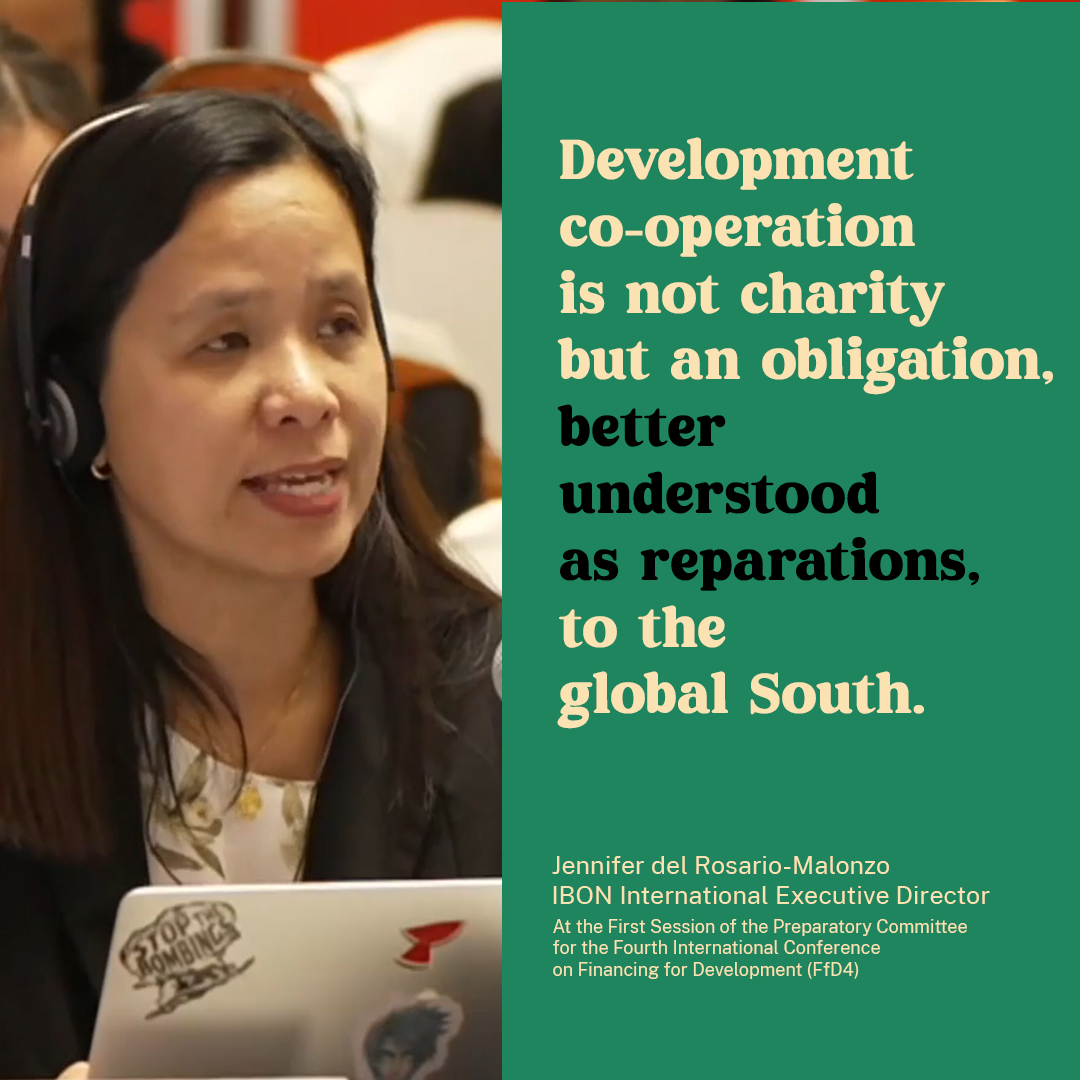The following input was delivered by Jennifer del Rosario-Malonzo, IBON International Executive Director, as part of the Civil Society FfD Mechanism, at the first session of the Preparatory Committee for the Fourth International Conference on Financing for Development (FfD4) held on 22 to 26 July 2024. Malonzo was the Initial Respondent at the multi-stakeholder roundtable on International Development Co-operation. FfD4 will be held in Seville, Spain in mid-2025.
Civil society is asserting the importance of FfD4 as a process to democratise global economic governance and the international financial architecture. It offers possibilities of addressing questions of power. In the international public finance architecture, it offers the chance to correct asymmetries between a large number of countries of the South and a smaller number of powerful countries who lead and continue to dominate the development cooperation system and the Multilateral Development Banks (MDBs).
We wish to tackle the governance question through a proposal towards Spain: A United Nations (UN) Convention on International Development Cooperation, a new normative framework consistent with and grounded in the Right to Development.
A Convention, which hopes to reshape IDC governance under UN auspices, could advance greater legitimacy from greater, better representation of global South countries in decision-making. In recent years, changes to the rules that have shaped ODA accounting and policy – to count private sector instruments, debt relief, for instance – have been made behind closed doors among a small group of countries that have specific foreign policy or private sector interests when it comes to development cooperation, and which have eroded ODA’s mandate away from its original vision.
This proposed reform would recognise that development cooperation is not charity but an obligation better understood as reparations to the global South. It would include converting the unmet ODA commitments, which are in the trillions, as a debt owed to the global South; defining a mandate for development cooperation to address inequalities and structural transformation; and bringing the effectiveness agenda back to the UN.
At present, the governance of International Development Co-operation, whether North-South, South-South or triangular, is needlessly fragmented and should be addressed and reimagined. A UN member-state space could ensure coherence between all forms of development cooperation as a normative and decision-making space that brings together all relevant actors. South-south cooperation is distinct from traditional development cooperation and is by its nature grounded in solidarity. Nevertheless, there is still a need to ensure that South-South cooperation aligns with the development priorities of the countries where it is deployed.
The question of governance is also relevant to MDB reform. Towards FfD4, we call on the UN to establish an intergovernmental process to review and transform international financial institutions and MDBs, leading to an overhaul of the international public finance architecture. We recall that the Bretton Woods Conference of 1944 was actually a UN Monetary and Financial Conference – 80 years of the Bretton Woods institutions is a good moment for the broader membership of the UN to reclaim governance of MDBs. Eighty years on, the prevailing Northern dominance of the major MDBs, particularly the World Bank, has promoted the chorus of a “financing gap” to be filled by Northern private finance, which refuse to account for how Southern countries’ power over their own resources and development paths have been blocked by the undemocratic architecture itself. These realities are why we assert that self-initiated reforms face the limits of realities of Northern power over MDB governance.
We highlight the primacy of public finance especially in the deployment of development cooperation. The primacy of public finance and public sector also applies in financing climate action, which must be additional to ODA. As I speak, my community, my home and family in Manila, Philippines are struggling from the heavy floods caused by Typhoon Gaemi, and in such times of disaster, we see how critical public systems and finance are especially in ensuring the public sector’s policy space over climate response – for peoples’ needs and not the imperatives of the private extraction of minerals for Northern demand.
We reaffirm the relevance of the development effectiveness agenda. We remind member-states that the origins of this agenda can be traced to the Monterrey Consensus where the principles of ownership, accountability, inclusion and results were first introduced. Amid the waning commitment and enthusiasm for this important agenda – the UN should play a strong role in revitalizing this agenda. #




![[FORUM] Sustainable Infrastructure and the World Bank’s Green Resilient and Inclusive Development: Continuities, Changes and Alternatives](https://iboninternational.org/wp-content/uploads/2022/04/GRID_SpringMeetings-2-300x200.png)